
JUVENILE DELINQUENCY
(Comic Books)
______________________
FRIDAY, JUNE 4, 1954
UNITED STATES SENATE,
SUBCOMMITTEE OF THE COMMITTEE ON THE JUDICIARYTO INVESTIGATE JUVENILE DELINQUENCY
New York, N. Y.
The subcommittee met at 10 a.m., pursuant to call, in room 110, United States Court House, New York, N. Y., Hon. Robert C. Hendrickson, (chairman of the subcommittee) presiding.
Present: Senators Hendrickson and Hennings.
Also present: Herbert W. Beaser, chief counsel; 1 Richard Clendenen, staff director; Peter N. Chumbris, assistant counsel-investigator, and Ed Hart, subcommittee consultant.
The CHAIRMAN. The hearing will come to order.
Today's hearing is a continuation of our subcommittee's investigation of that segment of the comic-book industry which deals with lascivious and lustful crime and horror material. The chairman wishes to reiterate what he said during our opening bearing on this subject on April 21, that we are not in the least concerned with about four-fifths of the output of the entire comic-book industry. We are attempting to find out to what extent questionable type comic books affect the mind of American youth.
We began the hearings and have continued them in the spirit of objective exploration. We are not out to get anyone.
Again I must reiterate, we are not a subcommittee of blue-nose censors. We are not, and have never been, a senatorial investigatory body unmindful of the dignity of the United States Senate, or unmindful of our obligation to investigate solely various facets of the problem of juvenile delinquency. We work in fields that we feel are pertinent to our subject. Only if we operate with common sense, decency, and a sincere interest in finding the answers to the complexities of the youth delinquency problems, can our subcommittee hope to make proper recommendations that will reverse the trend, or, at least, retard the rise in our disgraceful juvenile delinquency rate.
The response to our earlier hearings into horror comic books has been extremely gratifying to the chairman and my subcommittee colleagues, and to the staff members who have done a splendid job of preparatory work..
1 Herbert Wilton Beaser succeeded Herbert J. Hannoch as chief counsel to the subcommittee on May 1, 1954.
Our previous hearings dealt primarily with the publication of the comic books with which we were concerned. We heard from publishers, artists, psychologists, teachers, and public officials, many of whom have the same concern with these horror and crime comics that we have.
Today we are going to look into the matter of selling and distribution practices, and into certain proposals which have been advanced as helpful in combatting the detrimental influence upon youth of certain types of publications.
Before we hear our first witness, I want to state that as a result of our 2-day New York hearings there are several hopeful signs that the comic book industry as a whole has become concerned at the revelations brought out thus far. There are signs of movement within the industry in the direction of improving its total product. The responsibility resting upon the industry is very great. My colleagues and myself will watch with mounting interest every step in the right direction, which the industry takes, that will demonstrate its cognizance of its own responsibility to the parents and youth of our country.
I wanted to say here that I regret that my colleagues today are engaged in other matters of great importance in respect to their senatorial duties and they cannot be with me.
Now, it is my great pleasure to introduce to the television audience this morning a very distinguished son of New York, a member of the New York State joint legislative committee, which was designated to study the publication of crime comics.
I don't know where they got the word comics, Assemblyman, but they certainly are not comics. It is a pleasure to have you here. It is a tribute to the subcommittee that we have your distinguished presence.
I will now turn you over to the counsel for the subcommittee who will demonstrate your knowledge of this subject with his own proven ability.
Mr. FITZPATRICK. Thank you, sir.
Mr. BEASER. Would you be sworn, Assemblyman?
The CHAIRMAN. Do you solemnly swear that the evidence you are about to give before this subcommittee of the Senate Committee on the Judiciary of the United States Senate, will be the truth, the whole truth, and nothing but the truth, so help you God?
Mr. FITZPATRICK. I do.
The CHAIRMAN. I would like to say before you begin that we have been swearing all witnesses as a matter of tradition with this committee.
Mr. BEASER. Will you state your full name, your home address, and occupation.
TESTIMONY OF HON. JAMES A. FITZPATRICK, CHAIRMAN, NEW YORK STATE JOINT
LEGISLATIVE COMMITTEE TO STUDY THE PUBLICATION OF COMICS
Mr. FITZPATRICK. James A. Fitzpatrick, 88 Beekman Street, Plattsburg, N. Y.; member of the New York State Legislature, assembly man; chairman of the New York State Joint Legislative Committee To Legislate the Publication of Comics, and in private life, an attorney.
Mr. BEASER. How long has the committee for which you are chairman been in existence?
Mr. FITZPATRICK. Since 1949.
Mr. BEASER. Have you made any findings as a result of your investigations and hearings?
Mr. FITZPATRICK. We have.
Mr. BEASER. What are your findings?
Mr. FITZPATRICK. Well, sir and, Senator Hendrickson, if I may be permitted do so I would like to make a statement first.
The CHAIRMAN. You proceed in your own way.
Mr. FITZPATRICK. I also would like to ask that I be afforded slight latitude, in that I was unable to attend the previous hearings, and I would like to place in the record a general summary of the work we have done in the State of New York and particularly, our findings and conclusions with respect thereto.
May I say, as a member and chairman of this New York legislative committee, that I am not only delighted to have this opportunity to appear, but on behalf of my committee I should like to express our gratitude to you for the work you are doing, and to state how pleased we are that this subject is receiving the attention of the United States Congress, because we feel that it is one of the most serious subjects that now faces the people of this country.
I first became interested in this subject in 1949 when I introduced regulatory legislation in the State of New York dealing with comic books.
Shortly thereafter, and in the same year, the New York State joint legislative committee to study this subject was created.
The CHAIRMAN. You understand, Assemblyman that this subcommittee is not trying at all to invade the States or take away any authority of local government. We are trying to furnish some degree of leadership at the national level.
Mr. FITZPATRICK. Yes, sir; and I wish to make it quite clear that we are particularly delighted because we feel that this problem is so large that it must be handled effectively on the Federal level, and that while we feel we can do something in the States, we are hopeful that there will be Federal legislation forthcoming as a result of your studies.
Now, we have concluded after making our studies that the studies have conclusively demonstrated that a substantial percentage of publications, in the crime comic field and particularly in the pocket book and picture magazine field, which I understand you will get into at a later date, contain offensive material primarily concerned with crime, horror, sex, and lust, and that a constant reading of this type of material has been a direct and substantial factor in the sharp increase in juvenile crime and in the lowering of the whole general standards of morality of our youth.
Our most recent report, the report of the New York State joint legislative committee, has been made available to your committee and I am very much pleased to say that, as a result of our efforts this year, Governor Dewey has signed into law three bills dealing with crime comics and with indecent publications. The bills are printed in the appendix to the report. The bills that have been signed include a tie-in-sales a bill that you are very much interested in at the present time, as I understand it.
We have tripled the existing penalty under our penal law for the sale of salacious material, and we have also written into our law a new authority for injunctive relief to be sought by mayors of cities and corporate counsels of cities, or by the chief legal officers of other units of government, that do not actually have corporate counsels because of their small size.
Now, I should like, if I may, to submit a copy of this report in evidence at this time, and to request that it be included as a reference and incorporated as a part of my remarks and part of my testimony, by and on behalf of my committee, as chairman of the committee.
The CHAIRMAN. It will be the order of the subcommittee that this report be made a part of the subcommittee's files.
(The report referred to was submitted earlier by Mr. Richard Clendenen as "Exhibit No. 4c," and is on file with the subcommittee.)
Mr. FITZPATRICK. Thank you, sir.
I should also like at this time to invite your attention, Senator, to the remarks made by the former chairman of this committee, Assemblyman Joseph Carline, who appeared before the Gathings committee, and testified at quite some length during their hearings in Washington.
I should like also to invite your attention to the fact that in this report we have included a summary, not only of our previous work and findings with respect to comic books; but with respect to pocket size picture books, and with respect to television, and I understand you are going to have some television hearings here tomorrow.
I have read with great interest both the report of the Gathings committee and the proceedings of Senator Kefauver's committee studying crime in interstate commerce.
I was particularly interested in a letter written to Senator Kefauver by J. Edgar Hoover in August of 1950, for in it he states that the basic cause of the high rate of juvenile crime is the lack of a sense of moral responsibility among youth.
This seems to me to be the key to the whole problem now being studied by this committee, and I feel sure that you will conclude, beyond any question of doubt, that the horror and crime comic, the obscene pocket book and the so-called girlie magazine are among the principal factors helping to pervert, warp, undermine, and completely destroy all sense of responsibility, moral or otherwise, of today’s youth.
This being the case, it would appear that the time has now come for all agencies of government, local, State and Federal to unite in a concerted effort to rid the newsstands of this country of the current torrent of filth in print.
The CHAIRMAN. May I interrupt your prepared statement.
Which of these two types of magazines or publications do you think have the most serious influence on our young people?
Mr. FITZPATRICK. As I point out later in my statement, I think Dr. Wertham, who has testified before your committee, and who has testified before our committee, and who has recently published a very excellent book entitled "Seduction of the Innocent", has put his finger on it when he says we, in effect, start youngsters on the crime comic and the horror book in their younger years, and then graduate them to the completely salacious type of pocket book that we have here and, therefore, influence them right from the time when they are first interested in comics, right through their earlier years into adulthood.
I think they both have a direct influence in various age groups. I think the whole thing is combined.
The CHAIRMAN. You will treat with that later?
Mr. FITZPATRICK. Yes, sir.
The CHAIRMAN. I am sorry I interrupted you.
Mr. FITZPATRICK. That is perfectly all right. I am glad to have you do so at any time.
Now, Mr. Hoover also specifically stated in that same letter to Senator Kefauver, back in 1950, that the availability of salacious literature and presentations of any type making mockery of democratic living and respect for law and order, are important causes leading to an unhealthy crime situation among young people.
If there remains any doubt that comics are offering sex, horror, perversion, disrespect for law and a completely warped sense of values. I should like to refer this committee to our report and to one of the most flagrant examples I have yet seen a so called comic entitled "Panic," and published by "Tiny Tot Comics" and the managing editor is Mr. William M. Gaines, who testified before your committee on a previous hearing.
The CHAIRMAN. I shall never forget his testimony nor his demeanor.
Mr. FITZPATRICK. I believe after you have read this comic book you will never forget this comic book, either, because I have been studying this subject very hard for a long time. I have never yet seen anything which equals this, nor which so well demonstrates the very type of evil that I believe we are trying to reach.
Now, if I may beg your indulgence for just a few moments, I would like first, sir, to submit to you some photostats of sections of this particular book, and I would like to make reference to them very briefly, bearing in mind that this is published by Tiny Tot Comics.
In the first place, sir, you will notice that the very first section - first, the cover, sir, is obvious. Then inside you will note that they say they frankly didn't think this kind of thing would sell; that they had published a predecessor called "Mad," and they didn't think it would sell, but they found it did, and they put out Panic. This is the first issue of Panic.

The first page of the first issue of this new comic book No. 3 of your photostats, is entitled "Sex and Sadism" department. Now, this is for tiny tots. The chief character in the first skit is a man who apparently is a private eye. He comes in a room where a man has been badly mutilated. He says he will get the man and that the man will die, and that he will use dum-dum bullets which will go through his body and leave a very large hole.
His companion says, "You make me sick."
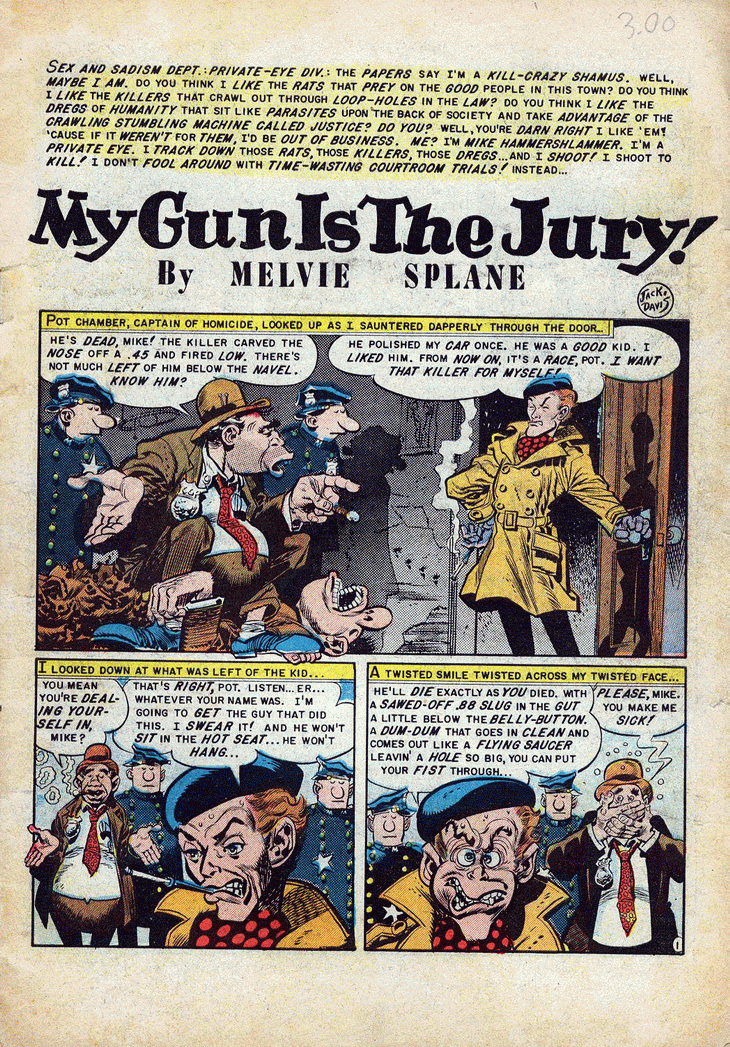
This is what is very important, sir.
The author of this thing then writes, "I make myself sick, but those idiots out there" meaning the people who read the book "buy this stuff; they eat it up; they love it; the gorier the better, this and sex."
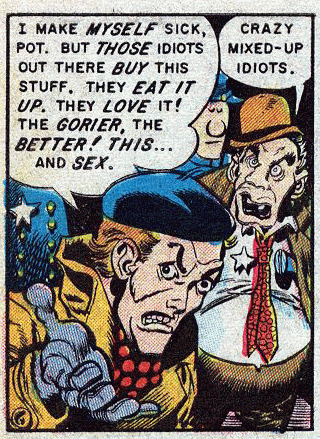
Now, if there ever was a complete and utter demonstration of the reason for the publication of this book, I respectfully submit, Senator; there it is and there it is in print. He is not satisfied with that. He comes up to this girl. He tells her he is a private investigator. She says, "how would you like to investigate me, honey?".
She starts to undress and he shoots her, "She gurgled up at me, spitting blood. She was still alive. I rammed my heel down into her face and did a graceful pirouette on her nose, grinning."
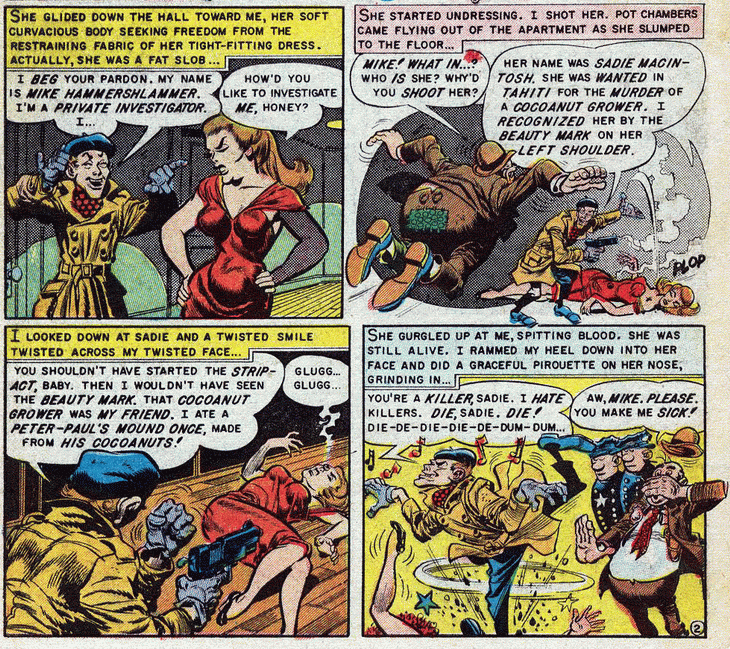
Again his companion says, "You make me sick," and again he repeats and comments, "I told you, Pat, I make myself sick, but I am supposed to be like this. These fiends out there love me like this."
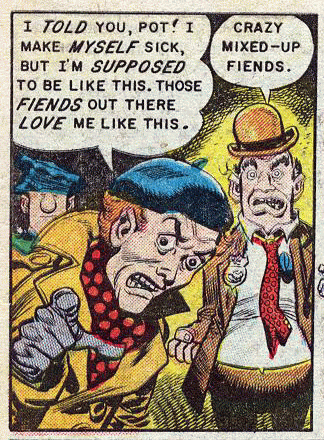
Then it goes on and, incidentally, as you will note in Mr. Hoover's statement, he particularly, warned about publications that make a mockery of the police.
I show you again, I believe it is on your next photostat, what they are doing to the police, "Dumb highway patrol cop," and then a picture of a policeman that looks much more like a mastiff than a policeman.
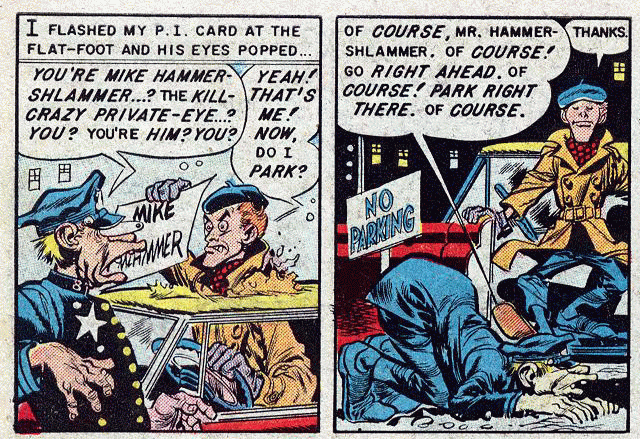
Then this book proceeds and we again find a photostatic sequence in the same plot that is not only fantastic, but which is complete and utter perversion. I am referring now to the sequence where this so-called private eye proceeds to this girl's home ─ and she, incidentally, had been requesting him to come with a statement that if he came he could have everything, including her. She then, and remember this is all for children, or could be for children; it is 10 cents on any stand; she then takes ─
The CHAIRMAN. However, I might comment for the record, that I had a naval officer tell me that he frequently went the rounds on his ship and threw a lot of these things over that the young sailors bring aboard.
Mr. FITZPATRICK. Right, sir; I was a naval officer for 3 years, and I know you are absolutely right. I know that the Navy during the last war banned certain types of comic books from the sailors in Korea, and whether they are for children or adults, this type of thing should not be published.
This is so flagrant that I just want to beg your indulgence for 2 or 3 more minutes.
She then drags this man up to her room and goes through all of the gyrations which are evidenced in the photostats, and finally begins to undress.
After additional invitations he then kills her and she turns out to be a man ─ complete and utter perversion.
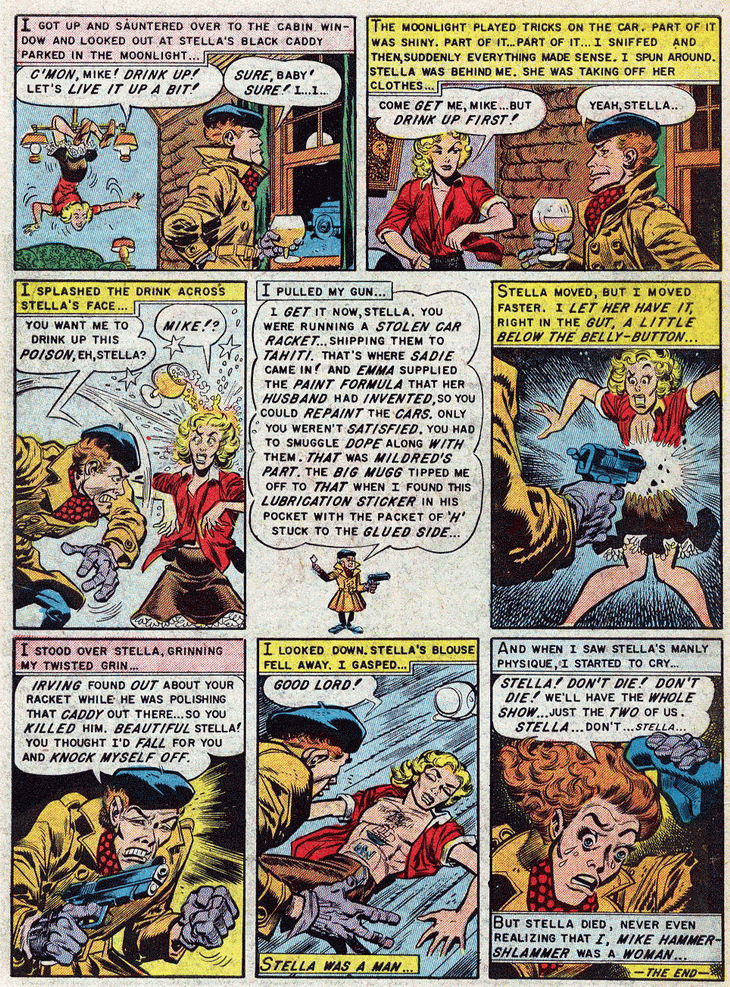
Now, skipping over the rest of this rot ─ and I call it rot without any reservation whatsoever ─ we come to the comic book idea of how the Night Before Christmas should be presented one of the most wonderful poems that we have ever had in our entire history, I believe. It starts out with the presentation of dead carcasses, which is not quite so bad, and then proceeds to stockings hanging before the fireplace, which takes the form of panties and a girl's leg with a garter on it, "Visions of sugar plus," Marilyn Monroe and Jane Russell; "Mama in her kerchief" becomes a girl in a bed.
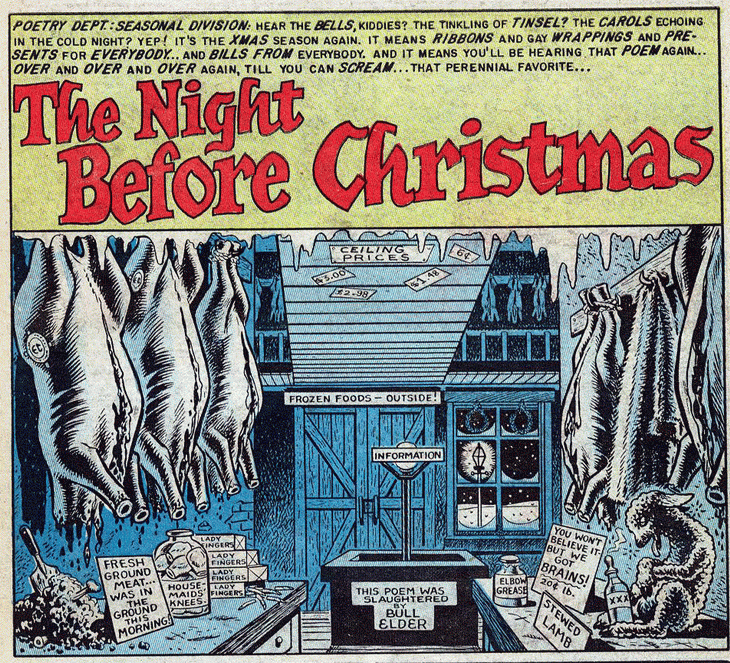
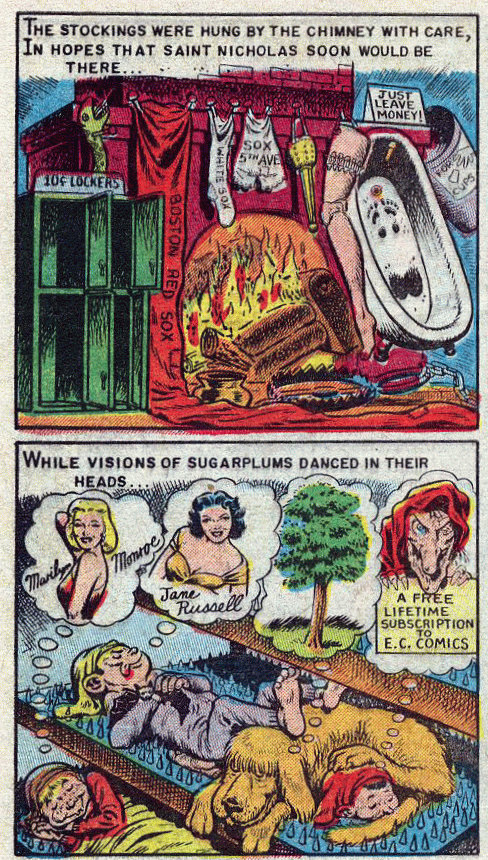
It ends up by Santa Claus going off with "Just Divorced" on the back. That is the kind of complete and utter rot we are giving to children under the guise of something that originally started out supposedly to be funny.
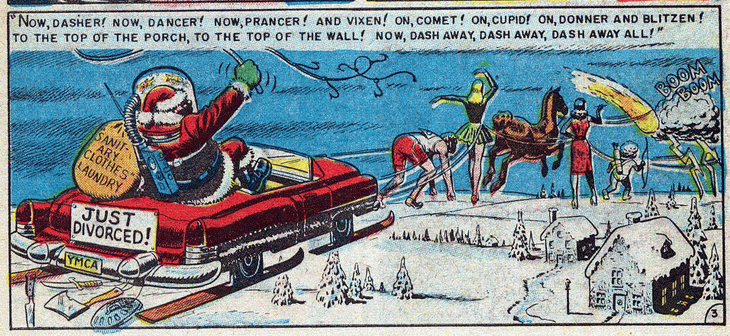
Incidentally, they call it Humor in a Varicose Vein.
The CHAIRMAN. Do you know how many of these particular publications go out every month?
Mr. FITZPATRICK. Of this particular one; no, sir, I do not. I don't have the staff to do the kind of detailed investigation that you are doing so expertly with this type of thing. I know that your counsel is doing a fine job of tracing individual publications.
The CHAIRMAN. I might ask our counsel for the record, do we have an account of the number of issues of Panic?
Mr. BEASER. We have minimum and maximum publication figures.
Mr. FITZPATRCK. There are approximately 90 million comic books a month being published and distributed. You have those figures. But how many of this particular issue, I can't tell you.
As I said before, and I pointed out in my statement, Dr. Wertham has told you how we start them on this, and we condition them, and bring them along.
Just briefly I would like to mention this because I think it ties in the direct picture. After we have conditioned them on this type of thing, on sex and horror, which he himself says is the sole purpose of this publication, we then give them this type of thing: She Lived in Sin, Shameful Love, Confessions of a Pick-up Girl, Shameless Play Girl, and Out of Bounds.
I would like to submit these to your committee, sir.
The CHAIRMAN. They will be made a part of the subcommittee's files. Let that be exhibit No. 26.
(The material referred to was marked "Exhibit No. 26," and received for the record.)
Mr. FITZPATRICK. Now, what the publishers of this type of book are presenting to our youth, as acceptable in the field of morals, can be determined from a description of sin, taken from one such publication and included in our committee's report at page 75. It is stated in one such publication that there is no such thing as sin and that "Sin is a label that has been attached to the most daring and enjoyable experiences which those who decry it are either old or too
unattractive to enjoy."
That, sir, is their version of sin.
Now, may I say also that we have tried in our report to show very quickly the type of complete and utter filth that can now be found in pocket books, available for children or anyone else, on the newsstands of this State.
On page 77 of our report, sir, you will find that for 35 cents, anyone, child or otherwise ─ I say child, of course, I am talking of the juvenile - anyone 14, 15, 16 years old, who might be interested for 35 cents in 1 book, can read about Lesbianism, call girls, marihuana, switch-blade knives, immorality, prostitution, murder, narcotics, and male prostitution.
This pocket-book material is not fit for adults, and certainly should not be permitted to fall into the hands of juveniles, or to be displayed where youngsters can view the covers, so aptly described by Margaret Culkin Banning as "pictorial prostitution."
Turning to the field of congressional action, I feel that one of the greatest services this committee can render is to seek by publicity to alert the clergy, the press, the officials, the parents, and the educators of this country to a full realization of the type of material that is being sold to young people throughout this land.
I am delighted to see that this hearing is being covered so well by the press and by the newsreel and television cameras. I think that is one of the greatest objectives that we have to obtain, both you, sir, on the Federal level, and we on the State level, in our respective States. Since the publication of this report, I have received innumerable letters from people who are horrified, who are scandalized at the type of thing that is on the stands, and who had no idea that comic books consisted of anything other than Bugs Bunny and Mickey Mouse. They just have not paid any attention to it.
The CHAIRMAN. Let the Chair assure you that I am one of those who had no idea of this sort of thing.
Mr. FITZPATRICK. I think that is a very common situation and I think, therefore, that one of the best things we can do is to present to the American public in full view the exact type of thing that is going on.
As you yourself said in your opening remarks, there are relatively few people who are responsible for this type of thing. Most of the publishers in this country are decent, honest people. A great percentage of the comic-book industry, as we pointed out in our report, is engaged in publishing decent comics that have a proper place for children.
But there is a small percentage; they are willful, and they will disregard anything and trample on anything to get what they want.
Now, to show you the type of interest that is being created, since the publication of our report, we have had inquiries from your own State of New Jersey ─ which, incidentally, is doing a splendid job and has recently introduced, and assure your familiar with, Mr. Thompson's bill in the New Jersey State Legislature ─ Minnesota, Massachusetts, Texas, California, and, many other States who are requesting copies of the report. They are talking about introducing similar legislation.
Community programs to curb sales are springing up in New York State. People are waking up at last, but there is still much to be done in the field of education.
Now, in the field of legislation, I feel that it is high time for our people, the Congress and the courts, to awaken to a realization that the framers of our Constitution could not have intended, the great guaranties of the freedom of the press as license for irresponsible publishers to contaminate the minds and morals of children for profit.
We need much more effective legislation both on the State and Federal level, and I believe that once we have overcome that hurdle, we will be able to get it, and I think that, the educational process is now setting in.
I think that the courts will eventually come back to the principle that was expressed by Justice Cohn in the appellate division in the Winters case. At that time he said this:
Pursuant to the police power and without abridging freedom of the press, the State may enact reasonable regulations in order to protect the general welfare, public safety, and order and public morals. While the right to publish is sanctioned ans secured, the abuse of that right is excepted from the protection of the Constitution, and authority to provide for and punish such abuse is left to the legislature.
The CHAIRMAN. It is really a privilege and not a right.
Mr. FRITZPATRICK. That is right, sir, but I think we have to do a little educational work in that regard.
The punishment of those who publish articles which tend to corrupt morals, induce crime and destroy organized society, is essential to the security of freedom and the stability of the state.
I believe that should be the basic philosophy behind our legislation.
The CHAIRMAN. I do not want to interrupt your chain of thought, but you are commenting on the need for Federal legislation. I know that your mind - I was a member of my own legislature in New Jersey ─ is running mostly to State legislation.
Mr. FITZPATRICK. That is right.
The CHAIRMAN. Have you thought out or spelled out in your own thinking any specific form of legislation that we of the Congress should adopt?
Mr. FITZPATRICK. Yes, sir; I have it in my statement. I am coming to it right now.
May I also say, too, that, of course, my experience is limited to eight years in the state legislature, and that I realize there are many difficulties involved in Congressional legislation, which do not face us, and that you have a great diversity of opinion from various parts of the Country.
The CHAIRMAN. Caused by State lines.
Mr. FITZPATRICK. Yes, sir. It makes it much more difficult, but we have just introduced and successfully passed this bill on tie-in sales. We have introduced also, and I have a copy in the back; in the appendix of our report a bill that I believe your New Jersey bill is patterned on, Senator, if I may be so bold as to say so.
I have had conversations with Mr. Kaplan, who is doing such a fine job, and your people in New Jersey. We have introduced in the State, and have not yet been able to pass ─ I hope with this conditioning process we are going to get to it ─ a bill which makes a distinction between selling literature to the general public and selling literature to juveniles, and to children.
Now, personally, I feel very strongly about that. I think that we forbid now the sale of liquor to children; we forbid the sale of tobacco to children, on the general ground that it affects their health and morals.
To me it is just as important to forbid the sale to children of anything which breaks down standards of morality, which stimulates sexual desire, and which contributes to juvenile delinquency.
I would like to see in the State of New York and on the Federal level, specific legislation banning the sale of horror comic books.
As far as I am concerned, I would like to see all of the horror comic books deleted from sales to children. I am not sure whether we can do that on a constitutional basis, or not, but certainly we have protections in our Constitution against that which is repulsive, if not indecent, and certainly this kind of material is repulsive.
I think we should seek both on the Federal and State level, legislation dealing specifically with thee sale to minors.
Then I feel this: We have heard a great deal about tie-in sales. You are going to find, I believe, sir, if I may be so bold as to say so, that it is a very difficult thing to tie people down on the tie-in sales.
That is probably not the proper way to put it, but that is the net result of it.
We have had a great deal of testimony. We have submitted copies of our written testimony to your council on previous dates, when we have had the same type of hearings in New York the same type that you are now having. We have found as a result of our personal investigation that, without any question at all, there are newsdealers throughout this State who have I been led to believe, that if they do not take these bulk packages that are distributed to them and do not make an effort to sell Panic and Sun Bathing, and that type of thing, along with the legitimate type of publication; they will not obtain the legitimate publications, or that they will lose their franchise.
I have a man in my own community has repeatedly said to any groups coming in attempting to clean up this material, "I would love to cooperate with you, but it is impossible. I can't do it because I would lose my franchise. If I lose my franchise, I can't take care of my wife and children", and so on.
Actually, we have found that two conditions exist. We are firmly convinced from people who have testified before us; one, that there are instances in the State of New York where the tie-in sale has been enforced, where the man has actually been told that he shall either accept A, B, and C, or he shall no longer get D, E, and F, the legitimate publications.
We have also found innumerable instances where in our opinion the dealer, when asked to cooperate by the community, has used as a cloak for continuing to sell for his own profit this type of trash, the cloak that he would lose his franchise, or that he would not be able to get the decent publications in the event he did cooperate with our people.
We have accomplished two things by our bill in New York State, I hope. One, we have banned the tie-in sale. We have made it illegal in the State of New York. There is a copy of my bill in the appendix. It is page 39:
No person, company, partnership, or corporation, shall as a condition to a sale or delivery for resale of any paper, magazine, book, periodical or publication, require that the purchaser or consignee receive for resale any other book or publication, reasonably believed by the purchasers or consignee, to be obscene, lewd, lascivious.
MR. BEASER. Where there is a tie-in sale, is that imposed by the local wholesaler? Does it go higher than that, to the distributor, to the publisher?
Mr. FITZPATRICK. We have instances of both. We have been told by the wholesaler that he must take and distribute to the retailer or he will not receive from either the nationwide distributor or the publisher ─
The CHAIRMAN. You have sworn testimony on this point, do you?
Mr. FITZPATRICK. Senator, those hearings were, 2 years ago. I believe that we have. You have heard similar testimony in the Gathings report, and last weak week whenever you were here before, a man here I believe who represented the newsdealers, gave you sworn testimony along those lines.
May I say this to you, sir: that we have all kinds of legal interpretations of this law and initially a large number of legal objections. What it amounts to simply and solely, I believe, is an exercise of a man's constitutional right to say, "I am in business; I am selling legitimate publications. I shall not be forced by you to take something which I personally think is obscene, indecent, or lewd, as a condition to my selling something else."
In any event, I should like to see that type of legislation on a Federal level.
Furthermore, I feel that we need to strengthen the postal regulations. There was a great deal about that in the Gathings report. My understanding is that under existing law the Postmaster General, if he wants to proceed, has to proceed by hearings and sometimes these hearings take as long as 6 months.
In the meantime, the fly-by-night operator is gone, or he is publishing something else.
I respectfully suggest that consideration be given to a law empowering the Postmaster General to apply to the courts for an injunction on not more than 5-day notice to the individual, company, or corporation involved, in distributing this type of literature.
You will find that we are attempting to use the injunction powers of the State in a bill which becomes effective here on the first of July, and we hope that it is going to be most effective in helping us to rid the stands of this kind of material.
Talking about postal regulations, and as a matter of regulation, I think you will be interested to know that I was recently flabbergasted to find that the most salacious type of material, advertisements for books that can be purchased, such things as "My Sister and I," "Double Exposure," "Homosexual Life" ─ everything of the worst type, has with recent months been mailed through the mails to, of all people, youngsters in preparatory school, unsolicited mailings to a list of youngsters in preparatory school, asking them if they don't want to buy this type of material.
I am pleased to be able to report to your committee, and I believe your counsel is aware of it because he has been after this kind of thing too, that within recent weeks the police department of the city of New York has raided the place from which this material came and has taken away, as I understand it, truckloads of material.
So, fortunately, that has been accomplished.
This is another practice which is going on through the mails. They are mailing to individuals with confidential return blanks with numbers so that you, sir, or I, if we wish to investigate this, could not take the blank and mail it and receive the material. I know, because I tried. The letters are all returned unanswered. This type of material, advertisements for books which I believe are completely sacrilegious for one thing ─ I won't even read the titles in this record. It is interesting to say that on the face of this they start out, "Banned by bigots who can't stand the meaning of the word 'sex'."
The CHAIRMAN. Maybe the titles also should go in the record. May I see them?
Mr. FITZPATRICK. Yes, sir. Some of them I have collected are particularly obnoxious and I believe they are sacrilegious.
The CHAIRMAN. These titles also will go into the record, but they will not be read in the proceedings.
Mr. FITZPATRICK. Thank you, Senator.
May I say that this publication on its face says, "Banned by bigots who can't stand the meaning of the word 'sex', but available to you if you hurry."
It goes on. I don't want to take your time to read it, but it says the bluenoses - and I am sure you are not one as you said in the beginning, and I hope I am not one, either, nor can I be considered a prude - we "must face the fact that certain well-intentioned, but narrow minded reform groups are threatening to choke off the source of this supply." but if you can hurry now you can get it before they are effective.
The CHAIRMAN. The Chair will instruct the recorder to include these advertisements also at this point. Let that be exhibit No. 27.
(The material referred to was marked "Exhibit No. 27," and is on file with the subcommitte.)
Mr. FITZPATRICK. Finally, it is respectfully submitted that consideration be given to providing limited, and closely scrutinized, immunity from antitrust regulation for any group of groups of publishers or distributors, working together for the sole purpose of enforcing industry supervision over the sale of obscene and objectionable literature.
Now, you mentioned and you are right, that the best way of cleaning up this mess is to have the industry clean up itself. We tried that. We had these publishers in; we took their testimony; we issued a report. We said very plainly, "Gentlemen we will give you an entire year to clean your own house. We feel the best regulation is self-regulation. You know this is bad. You clean it up and you will have no trouble from our legislative committee."
We came back in a year Senator. We called the same people before us. They had done nothing. They had attempted to do nothing.
I am speaking now not of the better segment of the industry, but the people who had so flagrantly published this type of material and who continued to do so.
After they said to us they had done nothing, we then proceeded to attempt to enact legislation, and we have finally been successful in passing some of it this past year.
Mr. BEASER. Actually from your experience, do the Federal anti-trust laws prevent them from getting together? They have never tried that; have they?
Mr. FITZPATRICK. I want to get that. I have talked to some of the more responsible people in the publishing, and I know you have. I have found this: in the first instances there have been numerous attempts by segments of the industry to get the renegades to come in and play ball and they won't do it. There have been organizations formed, and you get the people who are not publishing the bad materials anyhow. The other people stay outside.
Now, what is happening is this, and this is what I am told by representatives of the industry: they are reluctant to attempt any kind of coercion within the industry, because they feel that they will be subjecting themselves to prosecution under the antitrust laws.
I have direct evidence of that from this morning's paper. It is very interesting. In the first place, there was a piece in the Herald Tribune this morning about a newspaper's rejection of an ad in Poughkeepsie. The judge held that they could reject the ad. He says the newspaper must not be engaged in fraudulent conspiracy of furthering unlawful monopoly.
I believe the same philosophy is the thing that is acting as a deterrent to groups who are anxious to clean their own house. They have found that they just simply can't go to the fellow publishers and ask, "Won't you play ball?" And whatever means they can use in the industry to force them to play ball they are afraid to utilize because of fear of prosecution under the antitrust laws.
I feel there is a real merit in their contention that we should give serious consideration to opening the door for them to proceed within their own industry, because this type of self-regulation unquestionably in our opinion is the best of all regulations, but we have found it has not worked up to date.
I note again with a great deal of pleasure that William Richter, who appeared and testified before you on this tie-in sale problem, is acting as counsel now for a newsdealers association, which is forming a cooperative to attempt to ban comics. This piece was in the New York Times this morning.
This incidentally, is following the excellent work that is being done in New York by Mr. Kaplon of your own State, sir, along the same general lines. I hope this is the kind of thing of which we will see more and more.
The CHAIRMAN. I am glad you referred to that. announcement by Mr. Richter, because I have before me an article which indicates their effort to clean house within the industry, on the same subject.
Mr. FRITZPATRICK. That is wonderful. I hope they can do it. But I think we have to realize that efforts in the past have not met with great success and it is only because of that ─ and I believe this is very, very important ─ it is only because of that that the State of New York has had to step in, and I think you are going to have to step in on a Federal level.
Just one more thing that might be of interest to you, as an indirect result of the tie-in sale, the kind of thing that can happen with decent distributors. I have in my hand a letter ─ it happens to be from a distributor in my home town, but it is indicative, I believe, of what can be done ─ in which he states to the retailers that the tie-in sales bill of the State of New York has been passed, and that it will be effective on the 1st of July, and while it has not been their practice to purposely disseminate indecent material of any kind, they want it clearly known to their retailers that any material that they have reason personally to believe is indecent or obscene can be returned to them directly without any obligation. I believe that is a step in the right direction.
The CHAIRMAN. It most certainly is a step in the right direction.
Assemblyman, you talked about the industry putting its own house in order. Have you ever made a study of the number of printers engaged in this particular phase of these publications?
Mr. FITZPATRICK. Yes; we went into that quite thoroughly in our printed report in 1951. We found that time that 75 to 80 percent of all comic books sold in the United States were put out by 12 leading companies. The other percentage was put out by the fly-by-nights, which are the one's we are having great trouble in hitting.
Now, no one can sit down today, I believe, and tell you that there are X number of them, because that is the very nature of their business.
The CHAIRMAN. I am not talking about the publishers, but the printers.
Mr. FRITZPATRICK. No, sir; I do not know the answer to that. You mean people who actually print the publications?
The CHAIRMAN. That's right. Would it not be an interesting thing to have that figure, because they must be, I suspect that they would be, members of the printers' union, whatever the official name is, and maybe through the unions you could make an appeal on this subject and clean house that way?
Mr. FITZPATRICK. Well, I am afraid, Senator, that we are going to have to have at least the stick in hand.
In other words, while voluntary controls is the answer, if it will honestly be placed in operation by the industry, I do not think we are going to get it because people who publish this kind, of thing, in my humble opinion, have no morals, and if they have no morals in distributing filth and breaking down the whole moral attitude of our youth, I don't think they care whether or not they have any standing.
I am speaking now, remember; about the few, reserving as you did in your opening statement, for the better segment of the industry all of the praise that they deserve, all of the praise they deserve in attempting to clean their own house.
If they could get these other fellows in, wonderful; let us do it that way, but I think we are going to have to have a big stick to do it.
We went through some of the big comic-book printing plants and we found this with respect to that, at that particular time. They print great quantities of these and the prints are submitted months in advance, at least that is what we were told at that time. They simply do not have an opportunity within the plant to control the content of the material as it comes through.
We went to them at one time. We thought at one time ─ in fact, the first bill I introduced in1949 set up a separate bureau in the educational department, where all of these things would have to be submitted in advance.
Well, that censorship is not desirable; we have come to a realization ourselves that in our opinion that is not the best way to approach the problem.
I do think that the tie-in sales bill, the giving to the Postmaster General some additional authority to go in and get these people before they can get away, some thought to the antitrust ─ elimination of the antitrust restriction in the specific instance ─
The CHAIRMAN. I hope the staff are underscoring these remarks because they do relate to our Federal problem ─
Mr. FRITZPATRICK. I think those are the kinds of things that can be helpful. I think I have undoubtedly taken much time of your committee. I want you to know how appreciative we are of the opportunity to appear before you, how deeply interested we are, and I believe many more and responsible segments of the people of the State of New York are interested in seeing something done about this kind of thing which we think, if it is permitted to go unhampered and unrestricted, will honestly drag down the whole moral tone, not only of our youth, but of our entire country.
I hope, sir, that you will be highly successful. If there is any way in which we in our small way can contribute to the work of your committee, or if we can furnish you anything further from the material we have at our disposal, we will be delighted to do so.
The CHAIRMAN. Assemblyman, I speak for the whole subcommittee. I am sorry my distinguished colleagues are not here with me this morning because you have made a great contribution to this committee effort; I think one of the finest contributions in all of our labors.
I know that my colleagues would have been inspired as I am by your testimony here this morning, your forthright, courageous, and fearless approach to this problem.
Your report of course, will be carefully studied. You have gone into this field; you are ahead of us in this particular field in the area in which we are operating.
I just want to thank you from the bottom of a full and grateful heart for your appearance here this morning.
Mr. FRITZPATRICK. Thank you, sir, it was a real pleasure.
The CHAIRMAN. Counsel will call the next witness.
Mr. BEASER. Mr. Benjamin Freedman.
The CHAIRMAN. Do you solemnly swear that the evidence you are about to give before this subcommittee of the Judiciary Committee of the United States will be the truth, the whole truth, and nothing but the truth, so help you God?
Mr. FREEDMAN. I do.